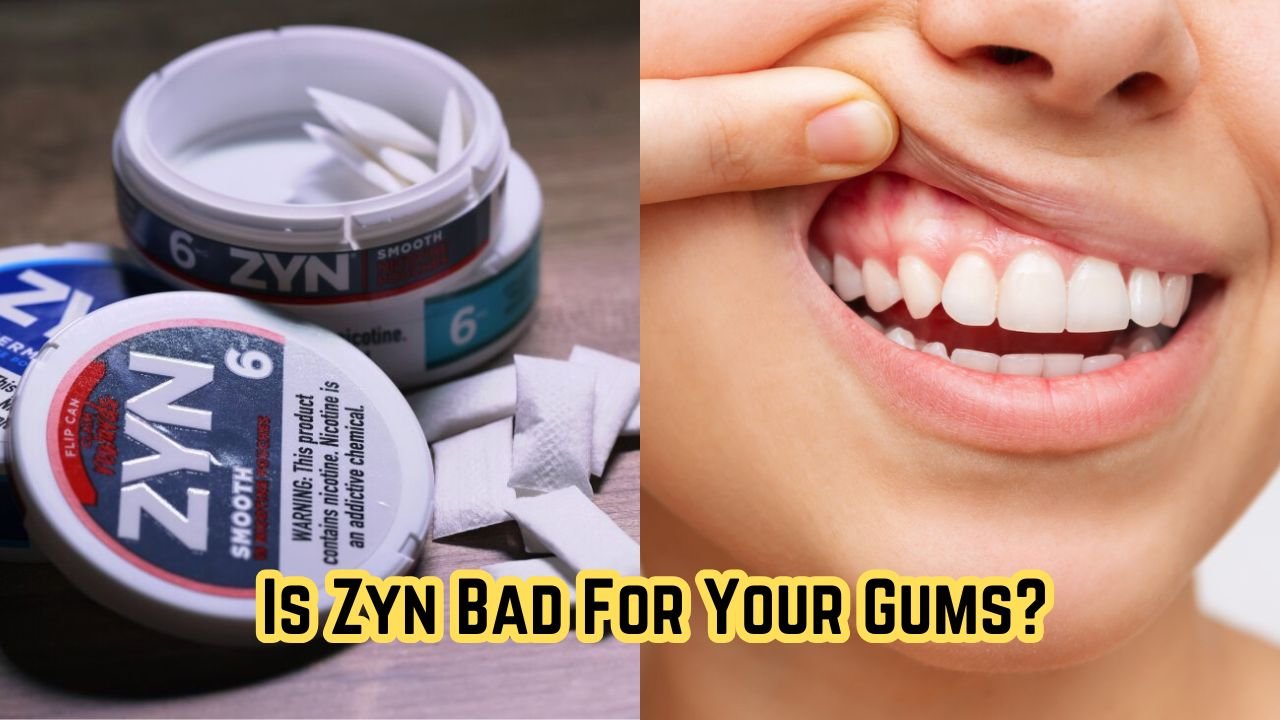Is Zyn Bad For Your Gums? Using Zyn nicotine pouches can cause gum irritation, recession, and increase the risk of gum disease due to the constrictive effects of nicotine.
Nicotine products have long been associated with various health risks, particularly when it comes to oral health.
One of the latest additions to the nicotine market is Zyn nicotine pouches, which have gained popularity as a smokeless alternative to traditional tobacco products.
However, with the rise of Zyn, many users are left wondering: Is Zyn bad for your gums?
In this article, we will explore the effects of Zyn on your gum health, what dental experts have to say, and how to mitigate potential risks.
Contents
What Is Zyn?
Small, white, Zyn nicotine pouches are a smokeless substitute for conventional nicotine products like cigarettes and chewing tobacco since they contain powdered nicotine.
These pouches are designed to be placed between the lip and gum, where they release nicotine into the bloodstream through the mucous membranes in the mouth. [Is Zyn Bad For Your Gums?]
Users do not need to chew or spit, which makes Zyn a more discreet and seemingly cleaner alternative to other nicotine delivery methods.
Zyn is marketed as a safer and more convenient option for those who want to satisfy their nicotine cravings without the drawbacks of smoking or the mess of traditional smokeless tobacco.
It is available in various strengths and flavors, including mint, citrus, and wintergreen, appealing to a broad audience.
However, despite being tobacco-free, Zyn still contains nicotine, which can have significant effects on oral health. [Is Zyn Bad For Your Gums?]
Although it is considered less harmful than traditional cigarettes or smokeless tobacco, it is important to consider the long-term impact of Zyn on your gums and teeth.
Comparison with Other Nicotine Products
Unlike traditional smokeless tobacco, Zyn does not contain tobacco itself, making it a potentially less harmful option in terms of carcinogens and other harmful chemicals.
However, it still delivers nicotine, which is known to have various adverse effects on the oral cavity. [Is Zyn Bad For Your Gums?]
While Zyn may appear to be a safer option compared to chewing tobacco or smoking, it is not entirely free of risks.
The primary concern remains the nicotine content, which affects gum health and can lead to other oral issues.
How Does Zyn Affect Your Gums?
Nicotine, the active ingredient in Zyn, is a vasoconstrictor, meaning it causes blood vessels to constrict.
When you use Zyn, the nicotine is absorbed through the lining of your mouth, leading to reduced blood flow to the gums. [Is Zyn Bad For Your Gums?]
This can have several negative effects on gum health, including irritation, recession, and an increased risk of gum disease.
Nicotine and Blood Flow
One of the most significant ways that nicotine impacts gum health is by constricting blood vessels. When blood flow to the gums is reduced, the gums receive less oxygen and fewer nutrients.
This can impair the gums’ ability to stay healthy, repair themselves, and fight off infections.
Without proper blood flow, gum tissue is more vulnerable to inflammation and damage, and any existing gum issues may worsen over time.
This vasoconstriction also affects the immune system’s ability to fight off harmful bacteria in the mouth. [Is Zyn Bad For Your Gums?]
Nicotine’s impact on blood circulation can make it harder for the body to heal from gum infections or inflammation, contributing to the development of gum disease.
Gum Irritation and Recession
Another way Zyn can affect your gums is through irritation. The nicotine in Zyn can cause inflammation in the gum tissues, leading to discomfort and tenderness.
This irritation can escalate if the pouches are used frequently or in the same spot in the mouth, as constant exposure to nicotine can damage sensitive gum tissue.
Gum recession, in which the gums separate from the teeth and reveal the dental roots, can result from this irritation over time. Gum recession raises the risk of tooth sensitivity, decay, and loss in addition to being ugly.
Health Risks Associated with Zyn and Gums
While Zyn nicotine pouches may seem like a cleaner alternative to smoking or chewing tobacco, prolonged use carries risks for your oral health. T
he main concern is the long-term effect of nicotine on your gums, teeth, and overall oral hygiene. Here are some of the primary risks associated with Zyn and gum health:
Gum Disease
Gum disease, also known as periodontal disease, is one of the most common oral health problems caused by nicotine products.
Gum disease typically begins with gingivitis, which is characterized by inflammation and bleeding of the gums. [Is Zyn Bad For Your Gums?]
If left untreated, gingivitis can progress into periodontitis, a more severe form of gum disease that causes damage to the bone and tissue that support the teeth.
Nicotine impairs the body’s ability to fight infection and repair tissue, making it harder to combat the bacteria that cause gum disease.
Because Zyn delivers nicotine directly to the gums, it can contribute to the development of gum disease over time, especially if used regularly.
Healing Process
Nicotine also interferes with the body’s natural healing process. [Is Zyn Bad For Your Gums?]
If you have a cut or injury to your gums or if you undergo a dental procedure such as a cleaning or a tooth extraction, nicotine can slow down the healing process.
Reduced blood flow to the affected area means that the tissue will receive less oxygen and fewer nutrients needed for recovery. This can lead to delayed healing, increasing the risk of complications and infections.
If you’re using Zyn and experiencing gum issues, it is crucial to be aware that it may take longer for your gums to recover, and the risk of worsening problems is higher.
Long-term Consequences
Over the long term, continued use of nicotine products like Zyn can have significant consequences for your gum health.
Chronic gum recession, persistent irritation, and an increased risk of gum disease are just a few of the potential issues.
If gum disease progresses without treatment, it can lead to tooth loss and other serious oral health problems.
In extreme cases, untreated gum disease can even affect your overall health, as bacteria from infected gums can enter the bloodstream and contribute to conditions such as heart disease and diabetes.
Dental Experts’ Opinions on Zyn and Gum Health
Dental professionals have long been concerned about the impact of nicotine on oral health. [Is Zyn Bad For Your Gums?]
While Zyn may be a less harmful alternative to smoking, it is still a nicotine product and carries risks for gum health.
Experts agree that nicotine affects the mouth in several negative ways, particularly by reducing blood flow to the gums and impeding the body’s ability to fight infections.
Expert Insights
According to dental experts, the vasoconstrictive effects of nicotine can significantly damage gum health.
The lack of blood flow to the gums makes it more difficult for the body to repair any damage or fight off infection.
Over time, this can lead to gum recession, irritation, and an increased risk of gum disease. [Is Zyn Bad For Your Gums?]
Additionally, nicotine can alter the balance of bacteria in the mouth, contributing to plaque buildup and the development of oral health issues.
Recommendations for Users
Dental professionals recommend that users of nicotine products like Zyn take extra care when it comes to their oral hygiene. [Is Zyn Bad For Your Gums?]
Regular brushing and flossing, as well as routine visits to the dentist, are essential to monitor gum health and address any issues early on.
Maintaining a healthy diet and staying hydrated can also help support overall oral health and minimize the impact of nicotine on the gums.
Can Zyn Be Used Safely Without Damaging Your Gums?
While it is difficult to completely eliminate the risks associated with nicotine use, there are ways to minimize the potential damage to your gums.
If you choose to use Zyn, it is important to practice good oral hygiene and be mindful of your gum health. Here are some tips for using Zyn safely:
Minimizing Risk
To reduce the risk of gum irritation and damage, consider limiting the frequency and duration of Zyn use. [Is Zyn Bad For Your Gums?]
Avoid placing the pouch in the same spot in your mouth every time to give your gums a break from the constant exposure to nicotine.
Additionally, try to limit the overall amount of nicotine you consume, as excessive use increases the risk of gum issues.
Oral Hygiene Tips
Maintaining excellent oral hygiene is crucial for protecting your gums if you use Zyn. [Is Zyn Bad For Your Gums?]
Use fluoride toothpaste to brush your teeth at least twice a day, and floss every day to get rid of food particles and plaque from in between your teeth.
Using an antibacterial mouthwash can help kill bacteria in your mouth, preventing the buildup of plaque and reducing the risk of gum disease.
Staying hydrated is also important, as it helps maintain saliva production and rinse away nicotine and other substances from your mouth.
Alternatives to Zyn
If you’re concerned about the impact of Zyn on your gums, there are alternatives to consider. [Is Zyn Bad For Your Gums?]
Nicotine-free products, such as nicotine patches or gum, can help curb cravings without exposing your gums to the risks associated with Zyn.
These options are less likely to cause irritation or gum recession and may be a better choice for those who are looking to quit nicotine altogether.
See Also: Is Zyn Bad For Your Liver? The Truth!
FAQs
Is it safe to use Zyn long-term?
While using Zyn occasionally may not cause immediate harm, long-term use can lead to gum issues such as irritation, recession, and an increased risk of gum disease.
What can I do to protect my gums if I use Zyn?
Practicing good oral hygiene, limiting your Zyn use, and visiting your dentist regularly for check-ups can help protect your gums from potential damage.
Can Zyn cause other oral health issues besides gum problems?
Yes, prolonged use of Zyn can contribute to tooth decay, tooth sensitivity, bad breath, and changes in the bacteria balance in your mouth. [Is Zyn Bad For Your Gums?]
How can I reverse gum recession caused by Zyn use?
Gum recession may require professional treatment, including deep cleanings or surgical options. It’s important to consult with a dentist for personalized recommendations.
Conclusion: Is Zyn Bad For Your Gums?
In conclusion, while Zyn nicotine pouches may seem like a safer alternative to smoking or chewing tobacco, they still pose risks to your gum health.
The nicotine in Zyn can cause gum irritation, recession, and increase the risk of gum disease. [Is Zyn Bad For Your Gums?]
To protect your oral health, it’s crucial to maintain good oral hygiene, limit your use of nicotine products, and visit your dentist regularly.
If you’re concerned about the long-term effects of Zyn on your gums, consider switching to nicotine-free alternatives or reducing your nicotine consumption altogether.
Prioritizing your oral health will help ensure that your gums stay healthy and strong for years to come.
Sources:
American Dental Association (ADA) – The ADA provides valuable information on how nicotine affects oral health, including the impact on gums and the risk of gum disease caused by products like Zyn.
Mayo Clinic – Offers expert insights into the health effects of nicotine and its relationship with oral health, particularly gum tissue and circulation.
WebMD – Provides information about the effects of smokeless nicotine products like Zyn, detailing potential risks to gums and general oral hygiene.

Azariah Lynn, from Girdwood, Alaska, is a blogger and small business owner. She learned about Zyn while working with her village’s anti-tobacco team. Azariah shares simple and helpful content on trending topics. She loves nature and writing for her readers.
